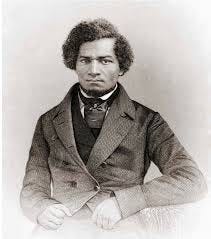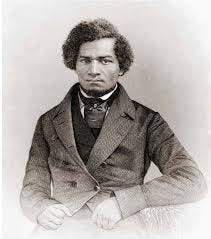Today In Black History: Frederick Douglass
How his early life formed his work in his later life.
Issue #682 Today In Black History, Friday, July 26, 2024
Did you know that you can listen to each “We Are Speaking” post on the Substack App? Download the app!
Help us to reach our July 2024 goals: +100 total new subscribers, including +20 new paid subscribers:
Please share and subscribe to help us grow our publication.
Who are your “Fav Five” who would enjoy “We Are Speaking?” Send them the link!
If you like us, REALLY like us, please click the “Like” button at the end of this post!
We appreciate your support!
Today’s Black History WOW!
Frederick Augustus Washington Bailey was born into slavery in 1818, on the Eastern Shore of Maryland, delineated by a stark deprivation of basic human rights. His mother, Harriet Bailey, was also enslaved, and the young Frederick was separated from her at an early age—a common practice designed to break familial bonds and reinforce the institution's stranglehold on its captives.
He saw her only a handful of times before her death when he was around seven years old. She was enslaved on another plantation, and would secretly walk for hours at night to spend a few minutes with her son before she had to walk back. Frederick later chose Valentine's Day (February 14th) as his birth date because that was the last time he saw his mother; she sat him on her lap and gave him a heart-shaped ginger cake.
In 1838, at the age of 20, Frederick escaped from slavery, adopting the surname Douglass from a character in Sir Walter Scott’s poem “The Lady of the Lake.” His escape was meticulously planned, aided by a network of abolitionists and sympathizers. He fled to New York City and then to New Bedford, Massachusetts, where he joined his fiancée Anna Murray, a free black woman who had assisted in his escape. The couple married and settled into a new life, but Douglass’s experiences in bondage had seared a mission into his soul.
To avoid being captured and re-enslaved, Douglass traveled overseas. For almost two years, he gave speeches and sold copies of his narrative in England, Ireland, and Scotland. When abolitionists offered to purchase his freedom, Douglass accepted and returned home to the United States legally free. The Douglass family relocated to Rochester, New York.
In Rochester, Douglass took his work in new directions. He embraced the women's rights movement, helped people on the Underground Railroad, and supported anti-slavery political parties.
Douglass remained a steadfast champion for equality, extending his advocacy for women's rights. He was the only man to attend the women’s suffrage conference in 1848 in Seneca Falls, New York.
After the fall of Reconstruction, Frederick Douglass managed to retain high-ranking federal appointments. He served under five presidents as U.S. Marshal for D.C. (1877-1881), Recorder of Deeds for D.C. (1881-1886), and Minister Resident and Consul General to Haiti (1889-1891).
On February 20, 1895, Douglass attended a meeting of the National Council of Women. He returned home to Cedar Hill in the Washington D.C. neighborhood of Anacostia, and was preparing to give a speech at a local church when he suffered a heart attack and passed away at the age of 77.
Today In Black History
In 1847, Joseph Jenkins Roberts, originally from Virginia, declared Liberia a sovereign nation, independent from the American Colonization Society.
In 1865, Father Patrick Francis Healy passed the final examinations in Louvain, Belgium, and later became the first Black person awarded a Ph.D.
In 1848, Frederick Douglass was the only man to play a prominent role at the first Women’s Rights Convention held at Seneca Falls, New York. He seconded the women’s suffrage motion introduced by Elizabeth Cady Stanton.
In 1926, the National Bar Association was incorporated for Black attorneys who were denied admission to the American Bar Association.
In 1948, President and Commander-in-Chief Harry Truman issued Executive Order #9981, which directed the equality of treatment and opportunity in the U.S. Armed Forces.
In 1998, Larry Doby and “Bullet” Joe Rogan, both Negro League pitchers, were inducted into the Major League Baseball Hall of Fame.
In 2020, the body of civil rights leader and Congressman John Lewis was escorted by a military honor guard over the Edmund Pettus Bridge in Selma, the same bridge where Lewis was almost beaten to death 55 years earlier.
Our paid subscribers are encouraged to discuss this post in our W.A.S. Chat Community.
Join Pamela Hilliard Owens’s subscriber chat
Available in the Substack app and on the web
You are also welcome to view “We Are Speaking” in Substack Notes. You can also read other Substack publications without subscribing to them when you join Notes.






